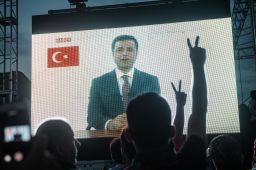The European Court of Human Rights called on Turkey to release the imprisoned leader of a pro-Kurdish opposition group Tuesday, ruling that detention was motivated by “stifling pluralism.”
Selahattin Demirtas, the former co-chair of the People’s Democratic Party (HDP), was first arrested in November 2016 for alleged links to the Kurdistan Workers party (PKK), which is considered a terrorist group by Turkey, the United States and European Union. Demirtas was a member of the Turkish parliament at the time of his arrest.
The 45-year-old former human rights lawyer faces a series of terrorism-related charges and a combined sentence of 183 years if found guilty.
Demirtas has consistently denied all charges.
On Tuesday, the ECHR said that it had accepted that Demirtas had been arrested and detained on “reasonable suspicion” of having committed a criminal offense but the grounds on which Turkey has extended his pretrial detention are not “sufficient.”
Citing a “tense political climate” in Turkey that has “created an environment capable of influencing certain decisions by the national courts,” the ECHR said that judicial authorities had “reacted harshly” to Demirtas’ conduct because of his position as an opposition leader and a dissenting voice.
More than two years after a failed coup attempt aimed at unseating President Recep Tayyip Erdogan, authorities continue to detain and arrest people who, they say, are linked to the attempted uprising – including members of Demirtas’ party, the HDP.
Throughout his two-year imprisonment, Demirtas has continued to galvanize supporters and even opposed Erdogan in this year’s presidential race. The HDP took more than 10% of the vote in the June 2018 election, enough for the party to enter parliament for another term.

Erdogan’s presidential win, combined with a narrowly won constitutional referendum in 2017, gave him sweeping new powers that include wide-ranging executive authority – authority that his critics say is a blatant power grab that threatens the independence of the judiciary.
Speaking to those campaigns, the ECHR said that it was “beyond reasonable doubt” that Demirtas’ detention “had pursued the predominant ulterior purpose of stifling pluralism and limiting freedom of political debate, which was at the very core of the concept of a democratic society.”
The ruling says that Turkey is to pay Demirtas 25,000 euros (approximately $28,469) in costs and damages.
In a speech on Wednesday, Erdogan accused the ECHR of not being objective and questioned its authority.
“No matter where you go in Europe today, while supporters of terrorist organizations roam free, the citizens who love our country are being suffocated,” Erdogan said, referencing the supporters of Fethullah Gulen, the US-based, reclusive cleric accused by Turkey of hatching the 2016 military coup attempt.
“Are you following this ECHR? Do you have a ruling on these? No country or institution that praises Gulenists has the right to speak of democracy. This isn’t seeking justice, it’s simply terror-loving,” Erdogan said.
On Tuesday, Erdogan told reporters in Ankara’s parliament that “ECHR decisions are not binding for us,” according to state-run Anadolu news agency.
“There are several decisions that they took related to terror organizations. They are all unfavorable (to us),” Erdogan added, saying that it was up to Turkey to decide how to deal with terror-related cases.
“We’ll make our counter-move and finish it off. It is not ECHR that put down terror in Turkey. Terror lasted. And it is still going on. It is the Turkish people that pays the price,” he said.
Isil Sariyuce contributed to this report.

